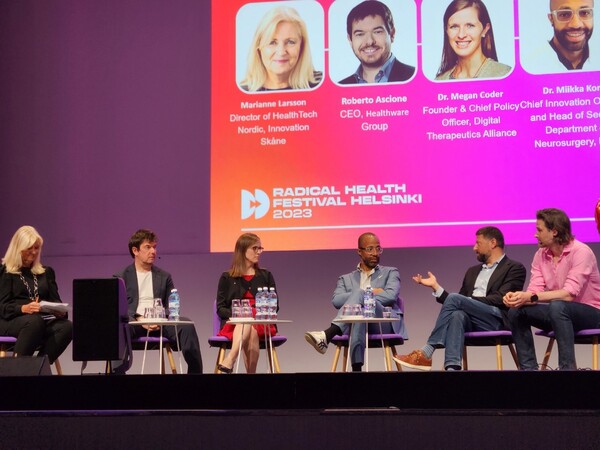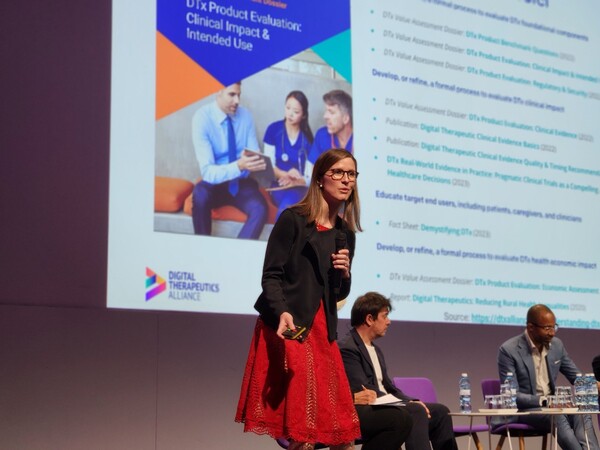HELSINKI -- By Marianne Chang/Korea Biomedical Review correspondent -- Despite decades of innovation in healthcare with AI solutions and digital therapeutics (DTx), the adoption of these technologies in clinical spaces is still lagging, experts said.
In particular, an AI-based solution developed to quickly and accurately detect 99 percent of different brain hemorrhaging from CT scans is still caught up in bureaucratic red tape, slowing down its entry into the clinics, said Professor Miikka Korja, Chief Innovation Officer and Head of Neurosurgery at the Hospital District of Helsinki and Uusimaa (HUS) at Radical Health Festival Helsinki 2023 on Tuesday evening.
The Radical Health Festival Helsinki is a prominent pan-European health festival catering to international digital health professionals.
The event is taking place from Monday to Wednesday this week, providing a platform for professionals to engage in discussions, share knowledge, and explore the latest advancements in the field of digital health.

“The algorithm itself took about 20 hours to train and develop but clinical validations and subsequent regulations take several more years and that's why you can't see many AI algorithms in the clinical setting yet,” said Korja.
The Finnish professor emphasized the necessity of establishing test platforms to validate AI algorithms that are currently lacking on a global scale.
Accordingly, Korja stressed the importance of increasing the number of hospitals with the capabilities to conduct validation studies to accelerate AI adoption.
“It is possible to fully recover from brain bleeds but only if they can be caught at an early stage,” he explained. “We are aiming to prove this clinical validation soon and then move beyond the scope of brain bleeds.”
Bryan Sivak, founder, and managing partner at Evidenced, pointed out that open-source communities are using language learning models like ChatGPT to churn out a host of different applications.

“Frankly, I don’t know how you’re going to regulate this in the medical field and I believe that the wheels of bureaucracy don’t turn quickly enough to keep up with these innovations,” he said.
Megan Coder, founder, and chief policy officer of Digital Therapeutics Alliance (DTA), drew attention to the ISO definition of DTx devices that was newly furnished earlier this month, together with the DTA's recently published DTx Policy Pathways document.
DTA is a global non-profit trade association of industry leaders in DTx.

“This definition and pathway is something we can build upon in the industry to sort out the confusion and enable payors and policymakers to lean on this for guidance,” she said.
Leaders in DTx: Germany, Belgium, Korea
Discussing the topic of reimbursement for DTx devices, Germany, Belgium, and Korea were mentioned as leaders in the field of DTx.
“We've worked with an incredible coalition of health technology assessment individuals and Ministries of Health across Europe, Australia, and Asia,” Coder said. “There's a lot of interest and movement and documentation developed by the DTA is currently being used as the frameworks due to the lack of other guidance."
As a first-time event, Radical Health Festival Helsinki gathered the European health innovation ecosystem under one roof to address mutual issues like aging populations, shortages and burnouts of health professionals, unsustainable payment models, siloed information, and more in radical ways.
One example of a Finnish healthcare start-up embodying this mission is VEIL.AI which showcased its algorithm for anonymizing data for widespread sharing and use of digital health data in Finland.
On the same day, VEIL.AI also announced a three-year development project in Finland called “Future Clinical Trials” to anonymize sensitive personal health data for Bayer so it can be analyzed securely.
Related articles
- Daewoong's digital healthcare start-ups to seek stronger ties at Helsinki event
- Regulator ‘half-positive’ to digital healthcare firms' request to introduce DCTs
- ‘Innovative drug approvals require robust scientific evidence’
- WELT’s insomnia therapy device clinches Korea’s 2nd approved DTx spot
- Aimmed’s Somzz becomes Korea’s first approved DTx device for insomnia
- How should Korea deal with rapidly growing digital therapy device industry?
- How Nokia spurred Finland's burgeoning digital health ecosystem
- Korean digital health start-ups gain traction at Helsinki meet
- KT, LGU+ jump into digital medical device biz to expand market
- Equity investments, M&A spur Korean DTx industry's steady growth
- Korean regulator publishes English DTx and AI-related clinical guidelines
- Welt, Aimmed face delays in launching Korea's first approved DTx devices
- Number of DTx license applications since April remains ‘zero’
- Radical Health Festival Helsinki 2024 to kick off next week with focus on ‘Prevention and Precision at Scale’

